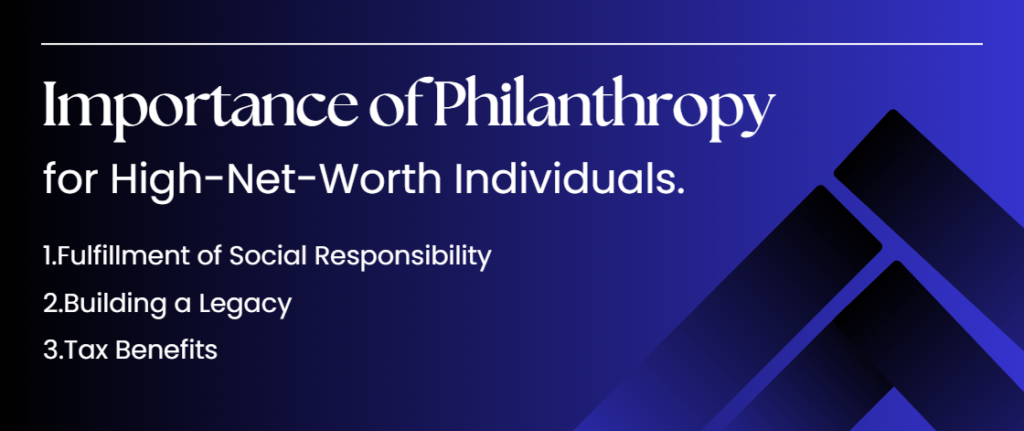
What is Philanthropy?
Philanthropy is the act of giving time, resources, or money to charitable causes. It is an altruistic behavior aimed at improving the well-being of others rather than serving personal gain.
Philanthropy can take many forms, from individual donations to large-scale foundations and corporate giving programs.

Examples of philanthropy include:
- Supporting social and environmental causes,
- Providing financial aid for education,
- Funding medical research,
- Investing in arts and culture, etc.
The Bill and Melinda Gates Foundation, for instance, has donated billions of dollars to fight diseases such as malaria and polio, while the Rockefeller Foundation has provided funding for initiatives focused on reducing poverty and increasing access to education.
So, this is about the concept of philanthropy. Let us now look at how it is relevant for high-net-worth individuals.

Importance of Philanthropy for High-Net-Worth Individuals
High-net-worth individuals (HNWIs) can significantly impact society through their charitable giving. Philanthropy is crucial not only for the betterment of society but also for the personal growth and satisfaction of HNWIs. The following is the importance of philanthropy for high-net-worth individuals:
- Fulfillment of Social Responsibility- Charitable giving is a way for HNWIs to fulfill their social responsibility. They have a unique position in society to impact the world positively. By using their wealth to support charitable causes, they can contribute to the betterment of society and give back to the community.
- Building a Legacy- Philanthropy is an opportunity for HNWIs to build a legacy that goes beyond their financial success. By supporting causes they believe in, they can leave a lasting impact on society and be remembered for their contributions. It can also help to create a positive reputation and improve the public perception of the individual and their business.
- Tax Benefits- Charitable giving can also provide tax benefits for HNWIs. For example, charitable donations can be deducted from taxable income in the United States, resulting in a lower tax bill. This can also be an effective strategy for estate planning, allowing HNWIs to reduce the amount of taxes their heirs will have to pay.
In conclusion, philanthropy is an essential aspect of the lives of high-net-worth individuals. Next, let us understand the importance of setting clear philanthropic goals.
Importance of Setting Clear Philanthropic Goals
Setting clear philanthropic goals is critical for individuals and organizations engaging in philanthropy activities. By defining specific goals, they can focus their resources and efforts towards making a measurable impact. Moreover, clear goals help ensure that philanthropy and charity efforts align with their values and beliefs.
Without clear goals, high-net-worth individuals may end up donating to various causes without a clear purpose, which can result in fragmented efforts and diluted impact. By setting specific goals, philanthropists can ensure that their resources are directed toward the causes that matter most to them.
In addition, setting clear philanthropic goals can also help to measure progress and evaluate the effectiveness of philanthropy activities. By regularly tracking and evaluating progress toward achieving these goals, philanthropists can determine the success of their efforts and make any necessary adjustments.
Thus, setting clear philanthropic goals is crucial for the success of philanthropy activities. By doing so, they can ensure that their philanthropy efforts have a meaningful impact and contribute to positive change in the world. Now, it’s time to look at the importance of legacy planning in philanthropy.
If you need some ideas about what to read next, here they are:
- Analyzing the Changing Landscape of Stock Market Regulation
- Active v/s Passive Investing: Which Strategy Fits Your Investment Goals?
- Angel Investing: Funding, Mentorship, and Valuation for Early-Stage Startups
Importance of Legacy Planning in Philanthropy
Legacy planning involves creating a plan to ensure that philanthropy efforts continue beyond their lifetime. It is a vital aspect of effective charitable giving for philanthropists. The following points highlight the importance of legacy planning in philanthropy:
- Family Members Carry On The Philanthropist’s Vision- Legacy planning should involve engaging family members in philanthropy activities. This can help pass on the philanthropist’s values and vision to future generations. By involving family members in philanthropy, they can learn about the causes and organizations that the philanthropist supports and continue to carry on their legacy.
- Continuous Philanthropic Efforts- Philanthropists should develop a succession plan to ensure their philanthropy efforts continue after they pass away. This can involve identifying successors to take over the philanthropy work, providing them with the necessary resources and training, and establishing a framework for decision-making.
- Ensures Long-Term Sustainability- Philanthropists should ensure that their philanthropy efforts are sustainable in the long term. This can involve setting up endowments, creating partnerships with other organizations, and investing in programs that have a lasting impact. By ensuring the sustainability of their philanthropy efforts, philanthropists can continue to make a difference for years to come.
A philanthropist example of effective legacy planning is the Bill and Melinda Gates Foundation which has set up endowments to ensure the continuation of their philanthropy work. By following these ways, philanthropists can leave a lasting impact on the world and continue to make a difference for future generations. Next, let us look at various options for philanthropic giving.

Various Options for Philanthropic Giving
Philanthropic giving is a meaningful way to contribute to a non-profit and make a difference. However, choosing the right giving option that aligns with your philanthropic goals and values is crucial. The following are various options for philanthropic giving:
- Creating a Private Foundation- Creating a private foundation is an option for those who want complete control over their philanthropy efforts. This option involves establishing a foundation managed by the philanthropist or their family. The foundation can then distribute grants to organizations that align with their philanthropic goals.
- Establishing a Donor-Advised Fund- Establishing a donor-advised fund is an option for those who want a more hands-on approach to their philanthropy efforts. This option involves contributing funds to a sponsoring organization, such as a community foundation or financial institution, and advising on how the funds should be distributed to non-profit organizations.
- Donating Directly to Organizations- Donating directly to non-profit organizations is an option for those who want a more immediate impact on their philanthropy efforts. This option involves identifying non-profit organizations that align with their philanthropic goals and values and then making direct contributions to these organizations.
So, philanthropists can choose from these options for philanthropic giving. Selecting the right option that aligns with your philanthropic goals and values is essential to impact the causes you care about significantly.
Next, we’ll look at a critical aspect of philanthropic giving, i.e., the tax implications.
Tax Implications of Philanthropic Giving
Philanthropic giving not only benefits the causes high-net-worth individuals care about but also has significant tax benefits. Here, we will discuss the tax implications of philanthropic giving and strategies for maximizing tax benefits while minimizing tax liabilities:
- Tax Benefits of Philanthropic Giving- When a high-net-worth individual makes a charitable donation, they can receive a tax deduction on their income tax return. The deduction amount varies based on the type of donation and the individual’s tax bracket. For example, if a high-net-worth individual donates $10,000 to a qualified charitable organization, they can receive a tax deduction of up to $10,000.
- Maximizing Tax Benefits- One strategy for maximizing tax benefits is to donate appreciated assets, such as stocks or real estate, instead of cash. This can provide a significant tax benefit by avoiding capital gains tax on the asset’s appreciation. Additionally, high-net-worth individuals can maximize their tax benefits by making a charitable donation that exceeds their annual income limit, which allows them to carry forward the excess deduction for up to five years.
- Minimizing Tax Liabilities- To minimize tax liabilities, high-net-worth individuals should consider setting up a donor-advised fund or a private foundation. These options provide flexibility in philanthropic giving while also allowing for significant tax benefits. Additionally, high-net-worth individuals can consider using a charitable lead trust or charitable remainder trust, which can provide both philanthropic giving and tax planning benefits.
Therefore, philanthropic giving provides significant tax benefits for high-net-worth individuals. By maximizing tax benefits through these strategies, philanthropists can significantly impact the causes they care about while also maximizing their tax benefits.
In the following section, let’s look at some tips for creating a philanthropic strategy.

Tips for Creating a Philanthropic Strategy
Creating a philanthropic strategy can help individuals make a meaningful impact through charitable giving. Here are some tips for developing an effective philanthropic strategy:
- Identify Causes- Start by identifying the causes that align with your values and passions. This can help you focus your giving on issues that matter most to you.
- Research Organizations- Conduct research to identify reputable organizations that align with your philanthropic goals. This can include reviewing financial statements, mission statements, and programs to ensure that the organization fits your charitable giving well.
- Set Goals- Establish clear and measurable goals for your philanthropy activities, such as the amount of money you want to donate or the number of people you want to help.
- Determine Level of Involvement- Decide on your level of involvement with the organizations you support. This can include volunteering, serving on boards or committees, or mentoring those in need.
- Establish Metrics- Create metrics to measure the success of your philanthropic giving. This can help you evaluate the effectiveness of your donations and adjust your strategy as needed.
- Seek Expert Advice- Consider seeking advice from philanthropy experts or financial advisors to help create a sustainable and impactful philanthropic strategy.
Effective charitable giving requires thoughtful planning and careful consideration, and a well-developed philanthropic strategy can help ensure that donations have a lasting impact. In the final section, let us look at another alternative that has been breaking records with its numbers & helping high-net-worth and ultra-high-net-worth individuals build a lasting legacy.
The Bottom Line
Philanthropy is an essential aspect of giving back to society, and there are various ways individuals and organizations can engage in it. It’s essential to align philanthropic efforts with personal values and interests while also researching and evaluating the impact of charities and organizations. By leveraging technology and collaborating with others, philanthropy can have a significant positive impact on communities and the world at large. Ultimately, philanthropy is about making a difference in people’s lives and contributing to a better future for all.
Frequently Asked Questions-
- What are the benefits of philanthropy for high-net-worth individuals?
Philanthropy provides high-net-worth individuals the opportunity to positively impact society, build a legacy, and gain tax benefits.
- What tax considerations should high-net-worth individuals be aware of when making philanthropic donations?
High-net-worth individuals should be aware of several tax considerations when making philanthropic donations, such as the deductibility limits on charitable contributions, the type of organization they are donating to, the timing of the donation, and the potential tax benefits of donating appreciated assets.
- How can high-net-worth individuals identify causes that align with their values?
High-net-worth individuals can identify causes that align with their values by considering issues they are passionate about, researching organizations’ missions and impact, and engaging with non-profits to understand their work better.
Join Our Newsletter
Elevate your financial game & join the ranks of elite investors with Secvolt’s exclusive newsletter.
Join Our Newsletter
Elevate your financial game & join the ranks of elite investors with Secvolt’s exclusive newsletter.
Don’t just dream of wealth; achieve it with Secvolt. Schedule a call today for personalized guidance on your investment strategy and join the ultra-successful.
Ready to unlock your wealth’s truest potential & cherish affluence?
Secvolt, our hedge fund, sets the bar high with a record-breaking performance of 262% returns in 2022. With the brilliance of our highly advanced quant models and the efficiency of our risk mitigation protocols, we are yet to see a loss!
We’re the perfect ally to help you succeed financially and build the lasting legacy you have always aspired for.
Get in touch today. YOUR LEGACY AWAITS YOU…





